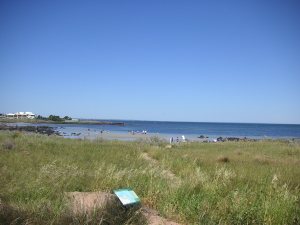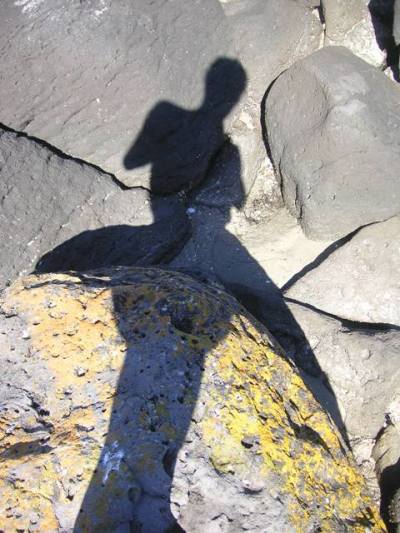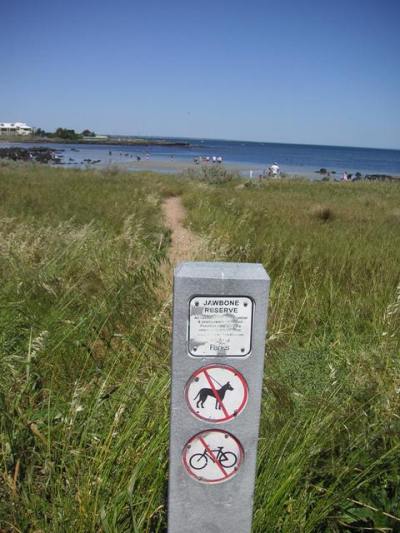‘The foreshore is bleak and desolate with a beauty not at once obvious…’ The Age, 1990
I am sitting on a rock 300 metres from shore. The tide is out. The rock protrudes from the water.
Behind me is Port Phillip Bay and beyond that, well beyond, is Bass Strait and then Tasmania. Ahead of me is a small beach and beyond it, about 300 metres too, is suburbia: a 25-year-old housing estate with courts and streets named after councillors, with bikepaths and playgrounds, a kindergarten, a retirement village, some shops and a supermarket.
Strange to think that it was a rifle range for just over a century, and an Olympic Games venue 60 years ago. This land once rang with explosions from firearms.
To the north-east is a high school. To the west is the refinery and its towers, its flames, its oils and petroleum.
It is the height of the season, 100 degrees in the old language. My wetsuit protects me from the rock’s barnacles, the sun’s summer rays, spikey sea urchins and bulbous jellyfish.
I am alone. Taking a breather.
How can I be this close to so-called civilisation and yet so far from the hustle and bustle of life?
The wetsuit helps. Armour of a sort. The ear plugs too. They keep the water out, and the murmur of nearby traffic: not just cars and trucks and trains, but the traffic of life – the roads of worry, the streets of doubt, the cul-de-sacs of my petty concerns. The avenues of our human frailties.
But the ear plugs cannot block out everything. The sounds of whining, churning engines seep through. I turn around and there they are, jet skis. One, then two, three. But they are well out of harm’s way and today is not a day to get upset, to get angry, to be muttering and cursing. I am on my rock.
I turn back to face the shore and its small beach. It is not a swimming beach: too many rocks. And the chance of snakes on the walk down here.
On a hot day like this the beach around the corner, a 10 minute walk , will be packed. Bodies everywhere, tight like tins of sardines. The car parks full. The kiosk flat out. The rubbish bins overflowing. The toilets a mess.
There are no such amenities at the little beach. There might be 20 people, tops. They’ve walked or pedalled here. They sunbake, sit in the shallows, explore the rockpools, snorkel.
I could not be on my rock without my snorkel. I love the sea but I am no swimmer. Synchronising the breathing and the turning of the head does not come naturally, as much as I’ve tried.
So here I am. Wetsuit, ear plugs, snorkel, gloves. Flippers. Do we ever look as ridiculous as when we try to mimic fish?
Humans have evolved from the sea, from prehistoric fish. We had gills before we had lungs. We had fins before we had limbs. We had tails before we had, well, flippers.
Sitting on my island, I wonder if would I be here if it were not for the closing of the rifle range and the selling of the land 25 years ago, if it were not for the end of 110 years of people shooting guns and pistols and rifles at targets that stood where some of the houses now stand?
The Williamstown rifle range effectively sealed off this beach for more than a century. It was a prohibited area. ‘It is said,’ wrote The Age in 1990, ‘gang kids dodging from butt to butt as an initiation trial were the only intruders down the years.’ (Butts are the area behind the target into which the shot impacts, having passed through the target.)
In December 1956 the rifle range hosted six Olympic Games shooting events, including rapid-fire pistol from 25 metres, free pistol from 50 metres, and free rifle from 300 metres. There were 156 competitors (all men) from 37 countries. The Soviet Union dominated, winning three gold medals, four silver and one bronze.
‘The weather during the Olympic events was quite pleasant,’ said one report. ‘The 50 metre range length was later found to be 48.5 metres, rather than 50. The site was close to the sea, and there were no walls for bullets that missed the targets.’
Local lore has it that over the years a small number of people fishing found themselves in the wrong place at the wrong time. In 1978 a 16 year old was blinded in one eye while fishing from a boat.
The beach became an official marine sanctuary in 2002, a protected area. Visitors welcome, but no fishing, no taking from rockpools, no spearguns. No dogs.
‘The foreshore is bleak and desolate with a beauty not at once obvious to your run-of-the-mill beach cultist,’ wrote The Age, in a summary of the proposed rifle range sub-division.
Preparing to go into the water – assembling my armour – there is beauty in standing on the shore, gazing out to the expanse of Port Phillip Bay. Behind is the city, ahead is the sea.
I wade into the shallows. Then I start snorkelling and water slips in between the wetsuit and my skin, forming a salty membrane. I think of an embryo in a womb, of amniotic fluid caressing me.
There is beauty in the wings and tails of stingrays, the stripes of zebra fish, the spikes of sea urchins, the pulsing of jellyfish, and the curious shape of banjo-rays – head of a stingray, tail of a shark.
There is beauty even when the fish are curiously absent, hiding between rocks, under sand. Camouflaged in the aquatic flora: the green-then-grey-then-silver seagrasses, waving with the breeze, glinting in the sunlight; green sea-lettuce; iridescent brown forkweed , and velvet codium. It’s not the Great Barrier Reef, granted, but not all beauty is grand and wondrous.
And then there is the water itself. On a hot, hot day, is anything softer, more alluring, more calming than water?
I wish I could be as naked as a new-born when I’m here, as naked as a fish, but life has its rocks and tentacles and spikes. I need my swaddling.
I have slowly snorkelled out to the rock. I have gazed upon the creatures and plants of this sanctuary. As I begin the reluctant return to shore (I cannot sit on this rock all day, I cannot snorkel all day) I think again of the embryo in the womb, now an infant ready to be born.
As the water becomes shallower, the rocks are replaced by seagrasses. Then the grasses give way to sand, all the while the water getting warmer until finally I emerge, peeling off flippers, gloves, snorkel. The membranous salt-water drains from the wetsuit as I step onto land.
On the shore by my towel I stand in just togs. The sun is beating down. I look out to sea for my rock.
A shorter version of this story was published in The Big Issue #504 Feb 5 to 18 2016




I love ‘cul-de’sacs of my petty concerns’ – I think of a little pocket or package that contains the daily annoyances, which we carry around with us. What a great phrase. I can imagine you sitting out there Vin, in total peace & immersion. The place you can go to press ‘pause’ on life. Beautiful story.
Great stuff Vin. I have shared this with the Williamstown Mussels swimming group and the Williamstown Open Water Swim Coaching group. Keep up the great work
Thanks. Those groups can actually swim (unlike myself)! You’ll find a few other Williamstown/beach/summer stories on my site.